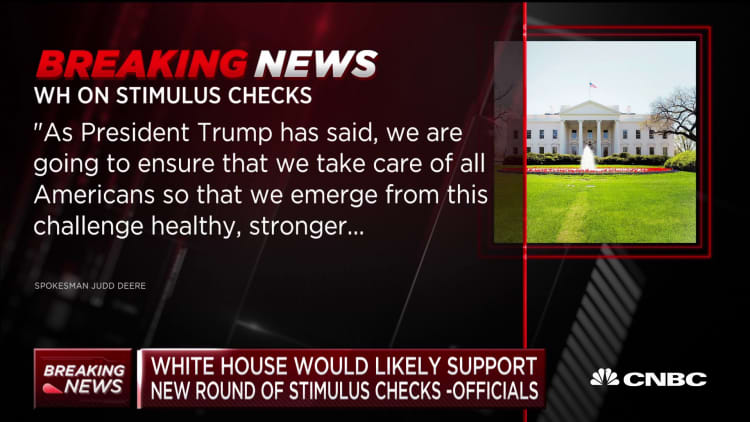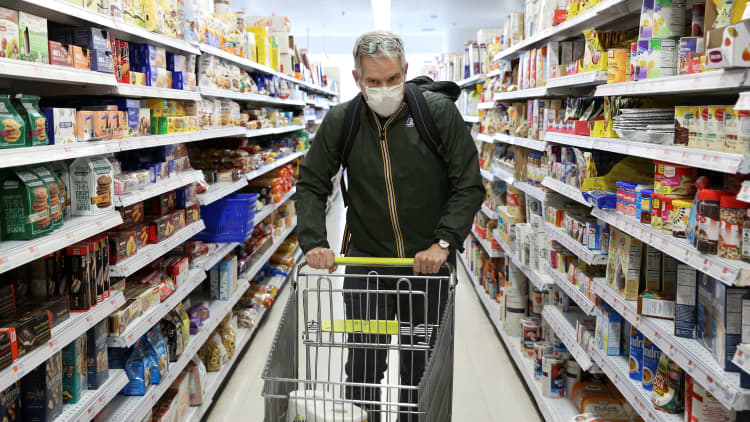The U.S. government passed the largest piece of stimulus legislation in our nation's history to allow people to keep paying their bills during the forced economic shutdowns due to the coronavirus.
Consumers, in turn, used a lot of that money to speculate in the stock market.
Securities trading was among the most common uses for the government stimulus checks in nearly every income bracket, according to software and data aggregation company Envestnet Yodlee. For many consumers, trading was the second or third most common use for the funds, behind only increasing savings and cash withdrawals, the data showed.
Yodlee tracked spending habits of Americans starting in early March and found that behaviors diverged around mid-April — when the checks were sent — between those that received the stimulus and those that didn't. Individuals that received a check increased spending by 81% from the week prior, and data show some of the spending went to buying stocks.
People earning between $35,000 and $75,000 annually increased stock trading by 90% more than the prior week after receiving their stimulus check, data show. Americans earning $100,000 to $150,000 annually increased trading 82% and those earnings more than $150,000 traded about 50% more often. "Securities trading" encompasses the buying and sells of stocks, ETFs or moving a 401k.
Yodlee's data is based on bank account transfers of 2.5 million Americans that received checks.
"There's clearly a correlation between Covid and people being reengaged with their money," Bill Parsons, Group President, Data Analytics at Envestnet Yodlee told CNBC.

"Securities trading did see significant lift week-over-week and I suspect that that's in part due to big changes in the market," added Parsons.
Under the Trump administration's $2.2 trillion CARES Act in response to the economic fallout of the coronavirus, the government sent $1,200 to individuals with annual income below $75,000 and $2,400 to married couples filing taxes jointly who earn under $150,000, according to IRS.
"There's no doubt that Covid has caused people to engage with their money much more actively, whether they are more actively saving or actively trading out of positions into new positions or whether they are engaging with their advisor," said Parsons. "This has created all sorts of dialogue about managing your money."
Consumers also spent the money on bills, rent and home improvement. Overall, the increase in spending shows the stimulus checks were needed and used, said Parsons.
Brokerage accounts surge
The coronavirus rout brought a copious amount of new accounts to online brokers in the first quarter, especially younger investors. Exact reasons for that surge in interest is unclear. Most analysts chalk it up to the attractiveness of the market comeback, but it appears the stimulus money at least played a part.
New accounts at most major online brokers — Charles Schwab, TD Ameritrade, Etrade, Interactive Brokers and Robinhood — were also likely bolstered by a recent move to zero commissions and fractional trading.
Schwab saw "monumental volumes" with a record 609,000 new accounts in Q1 and millennial favored stock trading app Robinhood saw daily trades up 300% in March year-over-year. Robinhood also told CNBC "over half" of its customers are first time investors.
"Covid is causing conversations among family members and family members with their advisors about what to do with their money and were seeing that in the data. As Covid has landed across the country, these discussions are becoming very real and people are taking action," Parsons added.
Market comeback
The major inflow of new market participants demonstrates Americans were and are hoping to buy the dip and get in on the comeback.
The longest bull market in history came to an end due to the economic calamity of the Covid-19 pandemic. Stocks spiraled into bear market as the government mandated a shutdown of the economy, leaving more than 38 million Americans unemployed.
However, markets have chugged higher on hopes of a vaccine and the economy reopening.
The Dow Jones Industrial Average and S&P 500 are up nearly 35% from their 52-week low in March. The tech-heavy Nasdaq Composite is up more than 40% since then.
"This will persist so long as covid remains in the headlines," said Parsons.

— with reporting from CNBC's Nate Rattner.
Subscribe to CNBC PRO for exclusive insights and analysis, and live business day programming from around the world.


